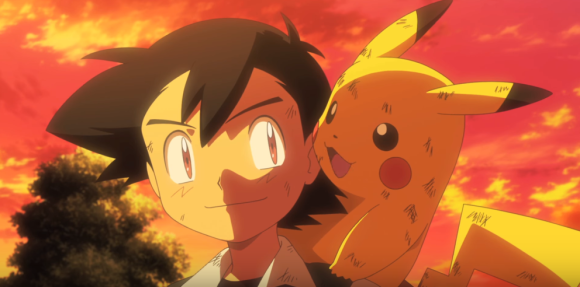
Fans in Japan have very different reaction to famous Pokémon’s first intelligible dialogue.
I’m really glad that the latest Pokémon movie, subtitled I Choose You!, has finally made its way to theaters in the English-speaking world. Not just because, as an anime fan who grew up in the pre-simulcast era, I know how agonizing the wait to watch stuff that’s already out in Japan can be, but because there’s a scene in I Choose You! that I’ve been wanting to talk about since its Japanese release in July, but didn’t want to spoil for overseas audiences.
As foreign Pokémon fans have now heard, or seen for themselves, there’s a scene in I Choose You! where franchise mascot Pikachu speaks. And no, not in the way that most Pokémon speak by saying their names with various inflections; Pikachu actually has an intelligible-to-humans line of dialogue, as shown in this clip shared by Buzzfeed’s Ryan Broderick.
Hi, I am just learning that Pikachu speaks English in the new Pokemon movie and, yes, it is extremely fucking weird pic.twitter.com/k5hm5lyW7Y
— Ryan Broderick (@broderick) November 13, 2017
In the midst of a dramatic battle against hostile Pocket Monsters, protagonist Ash is trying in vain to get Pikachu to take refuge inside his Poké Ball, prompting the following exchange:
Ash: “Pikachu, why won’t you get in your Poké Ball?”
Pikachu: “It’s because…it’s because…I always want to be with you.”
After 20 years of hearing nothing but variations of “pika” and “Pikachu” come out of Pikachu’s mouth, it’s startling to hear the beloved electric-type form a standard sentence, even though it’s heavily implied that the dialogue might simply be Ash’s interpretation, while under severe physical and mental stress, of Pikachu’s sentiments.
In the English-speaking world, many fans have dubbed the scene “weird,” or, as appears numerous times in the tweet thread shown above, “fucking weird.” Other comments included:
“If Pikachu speaks to me I will murder him in front of God and anyone.”
“It’s supposed to be all emotional, but everyone just sorta gets caught off guard.”
“Yeah, it’s hilarious.”
“Worst part of the movie right there.”
“This is terrifying.”
“Actually traumatized.”
“I can’t find one good thing about this scene.”
But on the other hand, when I Choose You! played in Japanese theaters, online reactions almost unanimously praised the scene where Pikachu speaks as the emotional high point of the entire film. At the screening I attended, there were no shouts of “What the fuck?” like in the above video, just gasps followed by gentle sobbing from an audience touched by the first direct statement from a character they’ve loved for 20 years.
▼ English trailer for Pokémon the Movie: I Choose You!
There are a couple of factors at play here. First, on average, Japanese movie-goers tend to be much less cynical than their American counterparts. A common local advertising tagline for emotionally charged movies from the U.S. is “Zenbei ga naita,” meaning “All of America cried (at this film).” Faced with an either/or situation, Japanese media consumers will almost always let genuine catharsis wash over them as opposed to taking the chance to fire off a snarky zinger.
In addition, the Japanese version of Pikachu’s speaking scene has a a bit of an advantage over the English dub. For the past 20 years, Pikachu has been voiced by Japanese voice actress Ikue Otani in both the Japanese and English versions of the anime, and when Pikachu speaks actual Japanese dialogue in the Japanese release of I Choose You!, it’s with Otani’s voice. However, the line had to be dubbed over in English for the English version of I Choose You!. Voice actress Kate Bristol’s friendly, high-pitched delivery is a pretty good approximation of Otani’s performance, but it’s still a different voice from the one English-speaking fans have been hearing from Pikachu over the past two decades, and you could make the argument that the aural shift makes it feel a little like Ash is delusional, as opposed to hearing a message that’s coming straight from Pikachu’s heart.
But hey, just be happy the producers didn’t go with Detective Pikachu’s deep, manly voice.
Source: The Guardian via Hachima Kiko
Top image: YouTube/The Official Pokémon YouTube Channel
Follow Casey on Twitter, where his deeply cynical nature and love of life in Japan often battle for control of his soul.

 New Pikachu character coming to Pokémon anime series after Ash’s retirement
New Pikachu character coming to Pokémon anime series after Ash’s retirement Pikachu’s voice actress talks about the challenges of playing the most famous Pokémon of all
Pikachu’s voice actress talks about the challenges of playing the most famous Pokémon of all New Google Home/Amazon Alexa app lets you have conversations with Pikachu!
New Google Home/Amazon Alexa app lets you have conversations with Pikachu! Whole-Pikachu curry plates with Gen 1 starter buddies coming to Pokémon Cafe【Photos】
Whole-Pikachu curry plates with Gen 1 starter buddies coming to Pokémon Cafe【Photos】 Pokémon: Detective Pikachu movie trailer surprises fans with first look at live-action characters
Pokémon: Detective Pikachu movie trailer surprises fans with first look at live-action characters Foreigner’s request for help in Tokyo makes us sad for the state of society
Foreigner’s request for help in Tokyo makes us sad for the state of society Japanese city loses residents’ personal data, which was on paper being transported on a windy day
Japanese city loses residents’ personal data, which was on paper being transported on a windy day Suntory x Super Mario collaboration creates a clever way to transform into Mario【Videos】
Suntory x Super Mario collaboration creates a clever way to transform into Mario【Videos】 Harajuku Station’s beautiful old wooden building is set to return, with a new complex around it
Harajuku Station’s beautiful old wooden building is set to return, with a new complex around it Ghibli Park now selling “Grilled Frogs” from food cart in Valley of Witches
Ghibli Park now selling “Grilled Frogs” from food cart in Valley of Witches Red light district sushi restaurant in Tokyo shows us just how wrong we were about it
Red light district sushi restaurant in Tokyo shows us just how wrong we were about it Starbucks Japan adds a Motto Frappuccino to the menu for a limited time
Starbucks Japan adds a Motto Frappuccino to the menu for a limited time Historical figures get manga makeovers from artists of Spy x Family, My Hero Academia and more
Historical figures get manga makeovers from artists of Spy x Family, My Hero Academia and more Smash Bros. director Sakurai stabs Kirby in the face, has delicious justification for it
Smash Bros. director Sakurai stabs Kirby in the face, has delicious justification for it Heartwarming response to Twitter question confirms that yes, Tikuwa_0913, there is a Santa Claus
Heartwarming response to Twitter question confirms that yes, Tikuwa_0913, there is a Santa Claus McDonald’s new Happy Meals offer up cute and practical Sanrio lifestyle goods
McDonald’s new Happy Meals offer up cute and practical Sanrio lifestyle goods Japanese ramen restaurants under pressure from new yen banknotes
Japanese ramen restaurants under pressure from new yen banknotes French Fries Bread in Tokyo’s Shibuya becomes a hit on social media
French Fries Bread in Tokyo’s Shibuya becomes a hit on social media Studio Ghibli releases new action figures featuring Nausicaä of the Valley of the Wind characters
Studio Ghibli releases new action figures featuring Nausicaä of the Valley of the Wind characters New private rooms on Tokaido Shinkansen change the way we travel from Tokyo to Kyoto
New private rooms on Tokaido Shinkansen change the way we travel from Tokyo to Kyoto Tokyo Tsukiji fish market site to be redeveloped with 50,000-seat stadium, hotel, shopping center
Tokyo Tsukiji fish market site to be redeveloped with 50,000-seat stadium, hotel, shopping center All-you-can-drink Starbucks and amazing views part of Tokyo’s new 170 meter-high sky lounge
All-you-can-drink Starbucks and amazing views part of Tokyo’s new 170 meter-high sky lounge Beautiful Ghibli sealing wax kits let you create accessories and elegant letter decorations【Pics】
Beautiful Ghibli sealing wax kits let you create accessories and elegant letter decorations【Pics】 Studio Ghibli releases Kiki’s Delivery Service chocolate cake pouches in Japan
Studio Ghibli releases Kiki’s Delivery Service chocolate cake pouches in Japan New definition of “Japanese whiskey” goes into effect to prevent fakes from fooling overseas buyers
New definition of “Japanese whiskey” goes into effect to prevent fakes from fooling overseas buyers Our Japanese reporter visits Costco in the U.S., finds super American and very Japanese things
Our Japanese reporter visits Costco in the U.S., finds super American and very Japanese things Studio Ghibli unveils Mother’s Day gift set that captures the love in My Neighbour Totoro
Studio Ghibli unveils Mother’s Day gift set that captures the love in My Neighbour Totoro More foreign tourists than ever before in history visited Japan last month
More foreign tourists than ever before in history visited Japan last month New Pokémon cakes let you eat your way through Pikachu and all the Eevee evolutions
New Pokémon cakes let you eat your way through Pikachu and all the Eevee evolutions Sales of Japan’s most convenient train ticket/shopping payment cards suspended indefinitely
Sales of Japan’s most convenient train ticket/shopping payment cards suspended indefinitely Sold-out Studio Ghibli desktop humidifiers are back so Totoro can help you through the dry season
Sold-out Studio Ghibli desktop humidifiers are back so Totoro can help you through the dry season Japanese government to make first change to romanization spelling rules since the 1950s
Japanese government to make first change to romanization spelling rules since the 1950s Ghibli founders Toshio Suzuki and Hayao Miyazaki contribute to Japanese whisky Totoro label design
Ghibli founders Toshio Suzuki and Hayao Miyazaki contribute to Japanese whisky Totoro label design Doraemon found buried at sea as scene from 1993 anime becomes real life【Photos】
Doraemon found buried at sea as scene from 1993 anime becomes real life【Photos】 Tokyo’s most famous Starbucks is closed
Tokyo’s most famous Starbucks is closed One Piece characters’ nationalities revealed, but fans have mixed opinions
One Piece characters’ nationalities revealed, but fans have mixed opinions We asked a Uniqlo employee what four things we should buy and their suggestions didn’t disappoint
We asked a Uniqlo employee what four things we should buy and their suggestions didn’t disappoint Princesses, fruits, and blacksmiths: Study reveals the 30 most unusual family names in Japan
Princesses, fruits, and blacksmiths: Study reveals the 30 most unusual family names in Japan You can get your Baskin-Robbins ice cream served in a Poké Ball in Japan
You can get your Baskin-Robbins ice cream served in a Poké Ball in Japan Wrinkly Pikachu cookies are the latest Japanese interpretation of Ryan Reynold’s CG Pikachu
Wrinkly Pikachu cookies are the latest Japanese interpretation of Ryan Reynold’s CG Pikachu New posable life-size detective Pikachu plushie commits crime of stealing our hearts【Photos】
New posable life-size detective Pikachu plushie commits crime of stealing our hearts【Photos】 New Pokémon earrings and hair accessories will have you looking Pikachu-perfect
New Pokémon earrings and hair accessories will have you looking Pikachu-perfect Believe it or not, you already know every single lyric to the new Pokémon Pikachu theme song
Believe it or not, you already know every single lyric to the new Pokémon Pikachu theme song Detective Pikachu debuts in Pokémon GO in event saluting franchise’s first live-action film
Detective Pikachu debuts in Pokémon GO in event saluting franchise’s first live-action film Japan’s new Pokémon donuts are here, so let’s eat Pikachu, Chansey, and some Poké Balls【Photos】
Japan’s new Pokémon donuts are here, so let’s eat Pikachu, Chansey, and some Poké Balls【Photos】 Pikachu engagement and wedding rings let you tell the love of your life “I choose you”【Photos】
Pikachu engagement and wedding rings let you tell the love of your life “I choose you”【Photos】 Subway-riding Pikachu displays terrifying Pokémon power/hidden limb
Subway-riding Pikachu displays terrifying Pokémon power/hidden limb Wrinkly Pikachu gets first-ever official plushie, sadness-smoothing hugs to come soon
Wrinkly Pikachu gets first-ever official plushie, sadness-smoothing hugs to come soon Brand-new Pokémon games, Sword and Shield, announced for Nintendo Switch【Video】
Brand-new Pokémon games, Sword and Shield, announced for Nintendo Switch【Video】 Pokémon fans can now get married with Pikachu marriage registration forms in Japan
Pokémon fans can now get married with Pikachu marriage registration forms in Japan
Leave a Reply